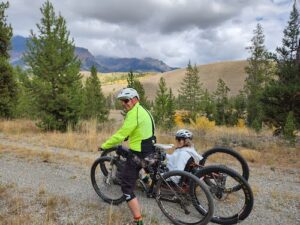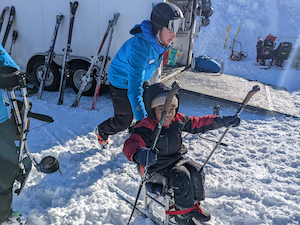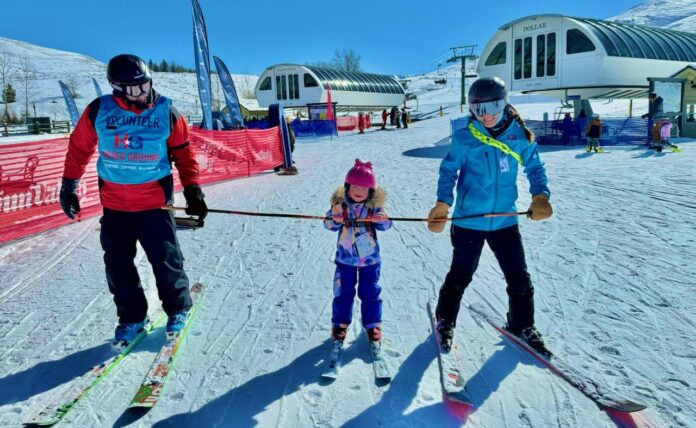BY ISAIAH FRIZZELL
If you’ve heard of Higher Ground, you’re in the know. This national therapeutic organization dedicates time, money and passion to working with victims of trauma and most often the fine men and women who have put their lives on the line, fighting for the freedoms we hold dear in the U.S. Constitution. Birthed and active in Sun Valley, they deliver, in part, courtesy of the fine organization, Sun Valley Resort, who have a history of working with the military.
See the Sun Valley Resort, Hollywood and WWII article at https://woodriverweekly.com/index.php/2024/01/09/sun-valley-resort-hollywood-and-wwii/
for a bit of wartime history on this longstanding Blaine County marvel.
Piecing together PTSD
When civilians enlist and take off for recruit basic training, they’re immediately thrown into a high-pressure, high-stakes community where the camaraderie and ultra-ordered chaos of the martial machine sets the tone for the next few years of their lives, and for some, their entire life. Waking before sunrise, extreme detail in the manicuring of both person and possessions, and severe physical entrainment commence with a bang. You’ve probably seen Full Metal Jacket and, while dramatized, R. Lee Ermey was an actual series commander and drill sergeant who brought an experience-shaped reality to Stanley Kubrick’s hyper-real masterpiece.
Recruit Basic Training (boot camp) is not a CrossFit workout where you finish, hit the couch and zone out to Netflix with a glass of red wine and cheese popcorn. From sleep deprivation to caloric confinement, obstacle courses to daily runs while chanting, the men and women who join our militaries are experiencing stress and eustress to the point of physical and psychological exhaustion. Try singing a song on your next jog or bike ride. Do you have the wind?
One of the most interesting things about this type of strenuous conditioning is that it’s done with a group—a group you’re melded to for 6-13 weeks. Whether friend or foe, these people become your immediate family. This is what’s often known as trauma-bonding. The people next to you are experiencing the same rigorous schedule but with their own psychological issues to deal with—thoughts of the family they left behind, dreams of the future, concerns for the possibility of battle. This adds up and while the physicality of the program helps move the mental energy, it can also compartmentalize it and create egregores that must be dealt with, massaged and worked out.
All of these elements crystallize as the recruit gets into formal shape and takes on that first assignment—often in a foreign environment, sometimes right into battle. Putting your life on the line and knowing you may die at your job is a primal, existential demand shoved onto your psyche. Once the recruit has finished the mission and returns, whether seeing the fight or not, the entire experience completes a lifestyle, fueled by the intensity and pressure not entirely unlike being on a sports team in the finals, where every play counts or working with on a film set where every penny is counted for and sheer performance requires pinpoint accuracy in motive and engagement. But winning or losing here means actual life or death. This changes people and PTSD is often the result. The psychological longing of that particular military lifestyle leaves many without meaning, without direction, when they attempt to re-enter civilian society. They’re cut off from their military family and beset by memories of cameradie in the act of ultimate survival.
Enter Higher Ground
We’re fortunate to have people with the passion and foresight to address these issues and work together to re-integrate the heroic individuals who have returned perhaps unscathed physically but absolutely shook mentally. Strong, actionable men and women with skills and sharp but strained minds have to now find their way in the orderly life of mainstream society. The excitement is mid and the stakes are low, comparatively. Sometimes even just having someone to talk to who’s shared the experience can make all the difference. That’s what Higher Ground offers with a bonus.
Higher Ground is a nonprofit 501(c)(3) organization funded by sponsors both private and public, many from Sun Valley, where the program began 20 years ago. With a stated mission of “Enhancing quality of life through therapeutic recreation and education” (highergroundusa.org), this consortium actively helps children and adults of any age, veterans and first responders who have cognitive, developmental or physical disabilities, many of whom are veterans struggling with the challenges of civilian life after a traumatic injury—visible or invisible. We can’t always see the effects of PTSD, yet they plague the victims. To qualify for entry in a program, one must have experienced trauma such as post-traumatic stress, traumatic brain injury, military sexual trauma or the like, which has led them to seek rehabilitation.
Higher Ground focuses on therapeutic recreation. ”It’s the power of human nature, activated by the wonders of Mother Nature” (highergroundusa.org). The goal is to unite people with camaraderie in a natural setting. With two primary programs, Adaptive Sports and Veterans/First Responders, the organization fully funds the entrants as they heal through physical and mental therapy.
Working with the best
Justin Reujawitz started his career with Higher Ground in 2017. As a newly commissioned officer in the Army, his first assignment was in Idaho with the National Guard. He saw an article on Higher Ground and recognized an opportunity to intern, get involved with other veterans and develop his skills as an officer. Reujawitz fell in love with the mission and is now a senior program manager. As an active Civil Affairs Officer for the Army Reserves, he works on the veterans and first-responder side, which runs around 30 events a year across the country. Reujawitz lives in Arkansas but this work with those in need offers him a chance to see the United States while making these philanthropic programs happen.
What does a program look like?

“From when they leave their door to when they get back home, they don’t pay a thing. Our program is six days long with a travel day at each end, so it’s four true program days. The model stays consistent with themes on each day and the themes stay the same while the activity may change. We fly in folks from all over the country. It’s a really neat opportunity to take care of and love on these people who have given so much for us.” Reujawitz glows when explaining the benefits he helps oversee. “Typically, what we see we call the Big Three—they struggle with a sense of purpose, identity and community. When you’re no longer in the military, it’s like, OK, what do I do? Who am I outside of this uniform? And compounded with that is the loss of the brotherhood, the sisterhood of that environment. When we bring them together, back around their peers, people who understand their experiences, it’s a really special opportunity for them to step away from that isolation, to be around people who it’s OK to talk with about those experiences… to be open about how stressful being in that environment is where you’re constantly exposed to these traumas, sort of what that can do.”
“One of the primary goals is community reintegration. They may feel like no one can understand what they’ve gone through, so they’re paired with volunteers. There’s so many people who pour into this program and even if they don’t have a military background, they start to see, wow, somebody does care about me, somebody cares enough to support this program and that helps build that trust. And we stay in touch with them. We have a three-year followup to help support them in the goals that they set within the program.”
Reujawitz speaks passionately about his beneficiaries. “We just started our Community Resiliency Units where those who are really motivated, taking this recreation and noticing the benefits and quality-of -ife improvements, we can support them and partner them within their home communities to run their own events. We have several of these crews popping up across the country where our past participants are putting on these events to work with veterans and first responders in their home communities.”
In Sun Valley last week, Higher Ground had eight couples, for a couples trip, skiing and snowboarding. Next is an ice-climbing program for Special Operations Veterans in Montana. Higher Ground will be back in Sun Valley in March running a snow sports program.

Higher Ground is year-round
”We’ve got something for every season, for every interest, ability, for everything. We only have so many spots on each program but, depending on the season, we have equestrian programs, fly-fishing, mountain biking, whitewater rafting, kayaking, even a couples partner dancing program. Anything you can imagine that involves recreation and moving your body, we’ve done it. We stay pretty busy all year-round.” Reujawitz acknowledges the holistic approach they take, the mind and the body are one and work together. As you may know, trauma is a nervous-system affliction. By getting physical and sharing with like minds, the opportunity to heal is further enhanced.
People are willing to help
Higher Ground began in Sun Valley as Sun Valley Adaptive Sports and has grown with the help of the VA Adaptive Sports grant, private donations and grant money. “The community here in Sun Valley is so incredibly supportive. Our most historical member is Penny Weise, a board member now, who has a ranch down in Bellevue and she is just amazing and incredibly gracious. It really does take an entire community to help support programs like this. We can’t do it without the support of all of our stakeholders.
“We do processing groups at the end of every day. It’s really easy to find the worst in people. You’re exposed to the worst of times. Our veterans have seen really tough things. Through these programs it helps shift minds when they see so many people to step up and support missions like this and be there to help each other out. We have an amazing relationship with Sun Valley Resort, that provides lodging and conference spaces to do group activities. Sometimes it’s one big house where everyone stays together or on the river we’ll all be camping together. We like to make it as communal as possible.”
How can you apply?
Visit the Higher Ground website, fill out an application and find a slot and a theme that interests you. There are volunteer opportunities run by Reed Mason, a Sun Valley resident who pairs the participants with a volunteer instructor. “Many of these volunteers have been around for years as volunteers. There’s some really neat opportunities to be involved as a volunteer and support the mission in that way. It’s incredible to see the transformation that can happen over a short period of time.”
Reujawitz notes the next program in Sun Valley runs the 10th through the 14th. Now may be your moment to give back to those who have given. Volunteer, recommend someone in need or sign up at https://www.highergroundusa.org/



